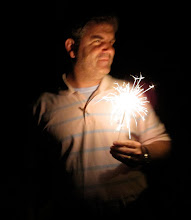As Zig Ziglar would say, "You gotta have Goals!!"-- Ideally, goals are realistic, written down, and with some timeframe. Goals are important, there is a ton of stuff written about them, and that's not what this article is going to discuss further--
OK, so having a goal is a big step, but you can't just do that and go to lunch. I would say the hard part is the execution-- the subsequent actions that lead to the achievement of the goal. There is an excellent book by David Allen - "Getting Things Done" -- one of the best take-aways I learned from that was the concept of the NEXT STEP. If you think about it, most of the anxiety people have (and the resulting procrastination) in going about a task, a project or a goal, is "How the heck am I going to accomplish this?" --Allen says that you can get anything off dead-center by making a note, right on it, saying what the next actionable step needs to be. As an example, you may have an in-basket with a pile of mail, reports, etc., that need your inspection, approval, review or other action. If you were to set aside an hour or so, and go through each item and, if the action would take less than a few minutes, then act immediately (like "throw in trash")-- if not, then make a note as to what the VERY NEXT STEP needs to be. You should find this very satisfying and feel a great sense of accomplishment when you finish. I don't do that nearly as much as I should - but every time I do, that is how I feel.
Luck Isn't a Plan Either
When it comes to project planning, everyone probably can agree that the GOAL is to complete the project on time, within budget and to the expected level of quality--- but the PLAN (the steps toward reaching the goal) is the most significant contributor to SUCCESS --with LUCK, being the other contributing factor. Most projects get completed, but there is a wide-range of degrees of success (good vs bad), with the more successful projects being on the better-planned end of the spectrum.
You may be thinking "That's just Common Sense" - OK, how many times do we all jump in to an activity, saying to ourselves "I can just wing this", or "I have an idea of what to do in my head" - and the task may be so simple that it works out, or if it is complicated, luck plays a role - and success results. But more often than not, action involving multiple parts or team members, or communication (even between a client and builder), to achieve success REQUIRES a PLAN. The PLAN that is more thought-through, and communicated with the team, the better.
What's The PLAN?
The PLAN I'm taking about should have:
1. Clear Completion Expectations (including Drawings, Specifications or other Scope Clarifiers) - What will it look like when it's done?
2. Sequence & Logistics of Assembly (pre-building the project) - How will the parts come together? Where do the parts get placed prior to assembly? What equipment will be needed?
3. Time Frame (Schedule & Milestones) - What will happen first, second, etc? How long will each (and the total) activity take? What are the activities that will affect other activities (critical path)?
4. Special Considerations (Safety, Access, Adjacency, Noise, Weather Protection, Utilities Service) - What is unusual about this project? What assistance is needed?
5. Estimate of Cost (Sum of all the anticipated labor, materials, equipment, utilities, and other stuff that will be needed to complete the project - plus an appropriate allowance for unknowns and inexperience) matching Budget (How much available for the project) - Is there enough money to do the project? - DON'T START if there is a question about this.
No Egg On Your Face
I could go on about planning, and there are thousands of resources available that provide much more detail about planning - and, in fact, I would be delighted to assist with specific project needs by providing a professional consultation or referral - but the intent of this is to outline a simplified way of thinking about projects, from constructing large commercial buildings, to making furniture, assembling a child's toy or building a tree fort.
So hopefully, you are already doing these things, and this is just a reminder for those times when you may think you have everything set in your mind - But, when starting a new project, I would ask you to think to yourself: "Is this something I do all the time, every day?" if not, it may be more like building your first tree fort, but now you're older - if you're not lucky, someone might get hurt.
 This cracked me up when I was a kid:
This cracked me up when I was a kid:Shemp is flipping eggs a couple of times, when they don't come down, he turns around, shocked to see Moe who just walked through the door--
Shemp: "Hey Moe, where'd you get the sunglasses?"
From: Hokus Pokus 1949
Keep smilin'!
Happy Memorial Weekend--


I appreciate your call to duty! - and not just the call, but the "how to make that call". All of us get stuck in between inspiration and getting on the ladder. The first rung is often the toughest - the first line in an essay, ... making that first phone call. The first fort visualization was key - thanks Stener!
ReplyDelete